Clever Replies to “Great Minds Think Alike”: A Grammar Guide
The phrase “Great minds think alike” is a common idiom used to express agreement or shared thoughts. While seemingly simple, responding effectively and grammatically to this phrase requires understanding nuances of language and context.
This article will provide a comprehensive guide to crafting clever, grammatically correct, and contextually appropriate replies. Whether you are aiming for humor, wit, or simple acknowledgement, mastering these techniques will enhance your communication skills.
This guide is perfect for English language learners, writers, and anyone looking to improve their conversational abilities.
Table of Contents
- Introduction
- Definition and Context
- Structural Breakdown
- Types of Replies
- Examples of Replies
- Usage Rules
- Common Mistakes
- Practice Exercises
- Advanced Topics
- FAQ
- Conclusion
Definition and Context
The phrase “Great minds think alike” is an idiom, a fixed expression whose meaning is different from the literal meaning of its individual words. It’s used to express agreement, often in a lighthearted or congratulatory way.
It implies that because two or more people have arrived at the same conclusion or idea, they are both intelligent or insightful. The phrase can be used sincerely or sarcastically, depending on the context and tone.
The phrase functions as a conversational bridge, affirming a shared understanding or viewpoint. It’s frequently used after someone else expresses a thought or idea that you also had, indicating concurrence.
Its use can foster a sense of camaraderie and shared intellect. Understanding the cultural context is crucial, as the phrase is more common in some English-speaking regions than others.
Structural Breakdown
The structure of the phrase “Great minds think alike” is relatively simple. It consists of an adjective (“great”) modifying a noun (“minds”), followed by a verb (“think”) and an adverb (“alike”).
However, the implied structure is an elliptical clause. The complete, though unstated, sentence is “Great minds think the same way,” with “alike” acting as a shortened form of “in a similar way.”
The verb “think” is in the present simple tense, suggesting a general truth or characteristic. The noun “minds” is plural, indicating that the statement applies to multiple individuals.
The phrase’s effectiveness lies in its concise and memorable construction. The implied subject-verb agreement is crucial; “minds” (plural) correctly pairs with “think” (plural form of the verb).
Understanding this underlying structure helps in crafting grammatically sound and contextually appropriate responses.
Types of Replies
Replying to “Great minds think alike” can take many forms, depending on the relationship between the speakers, the context of the conversation, and the desired effect. Some common categories include expressing agreement, using humor or wit, offering polite acknowledgement, or engaging in playful disagreement.
Agreement
An agreement response reinforces the shared viewpoint and acknowledges the connection. These replies typically express concurrence or amplify the original sentiment.
They can range from simple affirmations to more elaborate expansions on the idea. The goal is to strengthen the bond and show mutual understanding.
Such responses are generally positive and contribute to a harmonious conversation.
Humor and Wit
Humorous responses inject levity into the conversation, often by exaggerating the shared intelligence or playfully undermining the compliment. They can involve self-deprecation, witty remarks, or absurd scenarios.
The key is to maintain a lighthearted tone and avoid being offensive. Humor can make the interaction more memorable and enjoyable.
Polite Acknowledgement
Polite acknowledgements are appropriate in formal settings or when interacting with someone you don’t know well. These replies are typically brief and respectful, conveying agreement without being overly enthusiastic.
They demonstrate professionalism and consideration for the other person’s feelings. Maintaining a neutral and courteous tone is essential.
Playful Disagreement
Playful disagreement can be a fun way to challenge the assumption of shared intelligence, often by highlighting a minor difference or offering a contrasting viewpoint. It is important to ensure that the disagreement is lighthearted and does not come across as confrontational or dismissive.
This response can add an element of playful banter to the conversation.
Examples of Replies
The following sections provide examples of different types of replies to the phrase “Great minds think alike,” categorized by the type of response. These examples are designed to illustrate the variety of ways you can respond effectively and appropriately in different contexts.
Agreement Examples
These examples demonstrate ways to express agreement with the sentiment “Great minds think alike”. They are generally positive and reinforce the shared understanding.
| # | Reply | Context |
|---|---|---|
| 1 | “Indeed! It’s reassuring to know we’re on the same page.” | Formal meeting |
| 2 | “Absolutely! I was just thinking the same thing.” | Casual conversation |
| 3 | “You read my mind! I completely agree.” | Friendly discussion |
| 4 | “That’s exactly what I was going to say!” | Collaborative project |
| 5 | “Precisely! Our thinking aligns perfectly.” | Professional setting |
| 6 | “I couldn’t agree more. You’ve articulated it perfectly.” | Debate or discussion |
| 7 | “Totally! I’m glad we’re on the same wavelength.” | Informal chat |
| 8 | “Spot on! That’s precisely my view.” | Serious conversation |
| 9 | “Agreed! It’s good to have a shared understanding.” | Team meeting |
| 10 | “Yes, definitely! I’m thinking along the same lines.” | Business meeting |
| 11 | “Without a doubt! We see eye to eye.” | Negotiation |
| 12 | “You’re absolutely right! I concur completely.” | Formal debate |
| 13 | “True that! I’m in total agreement.” | Casual setting |
| 14 | “I second that! Great minds indeed.” | Group discussion |
| 15 | “You nailed it! I completely agree with your assessment.” | Performance review |
| 16 | “That’s my take on it too! We’re on the same track.” | Strategic planning |
| 17 | “Exactly! Our perspectives are aligned.” | Project kickoff |
| 18 | “Precisely my thoughts! I’m in full agreement.” | Conference presentation |
| 19 | “Couldn’t have said it better myself! We’re thinking alike.” | Brainstorming session |
| 20 | “Right on! I’m with you all the way.” | Team building event |
| 21 | “Word! I’m feeling the same way.” | Informal conversation |
| 22 | “Aha! I knew we were kindred spirits.” | Networking event |
| 23 | “Bingo! You hit the nail on the head.” | Problem-solving meeting |
| 24 | “Totally on board! I’m seeing things the same way.” | New initiative discussion |
| 25 | “For sure! Our thoughts are synchronized.” | Collaborative project |
Printable Examples:
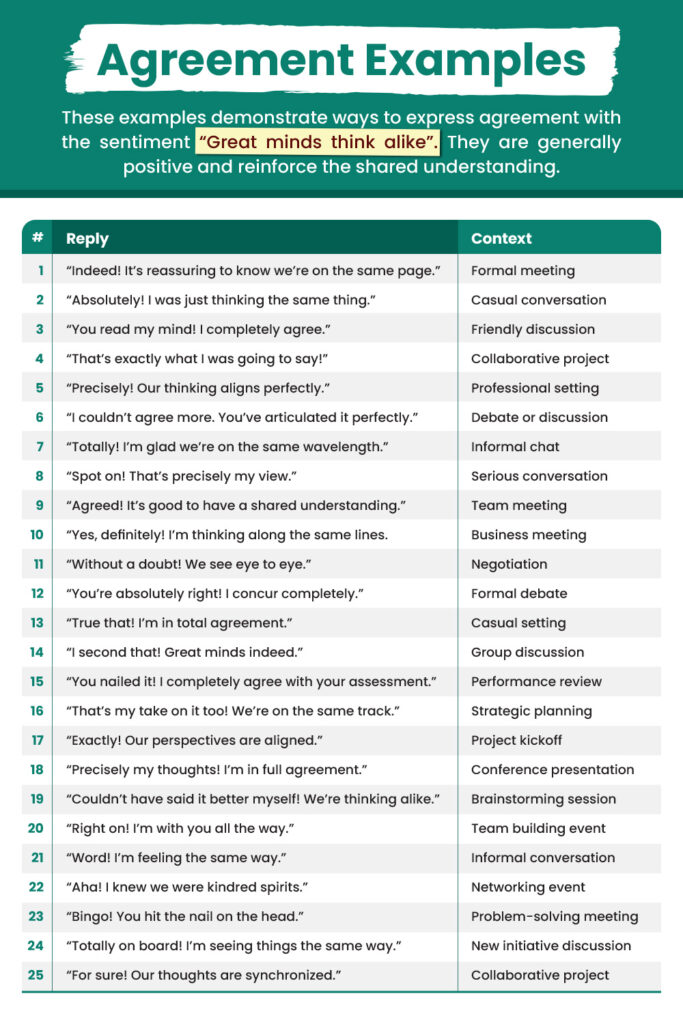
Humor and Wit Examples
These examples provide humorous and witty responses to “Great minds think alike”. They aim to inject levity into the conversation.
| # | Reply | Context |
|---|---|---|
| 1 | “That explains why we’re both so broke!” | Friends discussing finances |
| 2 | “Or maybe we’re both just guessing wildly.” | Uncertain situation |
| 3 | “Great minds, or just lucky guesses?” | After a successful prediction |
| 4 | “Let’s hope so, for the sake of everyone involved.” | High-stakes decision |
| 5 | “In that case, we’re both in trouble!” | Facing a difficult challenge |
| 6 | “Maybe we should start a think tank.” | Excited about shared ideas |
| 7 | “Or maybe we’re just overthinking things.” | Complex problem |
| 8 | “Great minds, or just procrastinators?” | Avoiding work |
| 9 | “Let’s not get ahead of ourselves.” | Maintaining humility |
| 10 | “Then why aren’t we rich yet?” | Joking about success |
| 11 | “Clearly, one of us is mistaken.” | Playful disagreement |
| 12 | “Quick, someone check the weather forecast!” | Anticipating the future |
| 13 | “Does this mean we can share a brain now?” | Silly conversation |
| 14 | “I’ll take that as a compliment… I think.” | Uncertain situation |
| 15 | “Maybe we should patent this idea!” | Excited about an invention |
| 16 | “Or maybe we’re both just delusional.” | Self-deprecating humor |
| 17 | “Let’s hope our spouses don’t find out.” | Joking about secrets |
| 18 | “Does this mean we can skip the meeting?” | Avoiding obligations |
| 19 | “Maybe we should start a cult.” | Absurdist humor |
| 20 | “Let’s just hope we’re not wrong.” | Facing uncertainty |
| 21 | “Or maybe we’re just incredibly lucky.” | Acknowledging good fortune |
| 22 | “Quick, to the batcave!” | Enthusiastic response |
| 23 | “Does this mean I get a raise?” | Joking about rewards |
| 24 | “Maybe we should write a book.” | Excited about shared knowledge |
| 25 | “Or maybe we’re both just tired.” | Exhausted conversation |
Printable Examples:
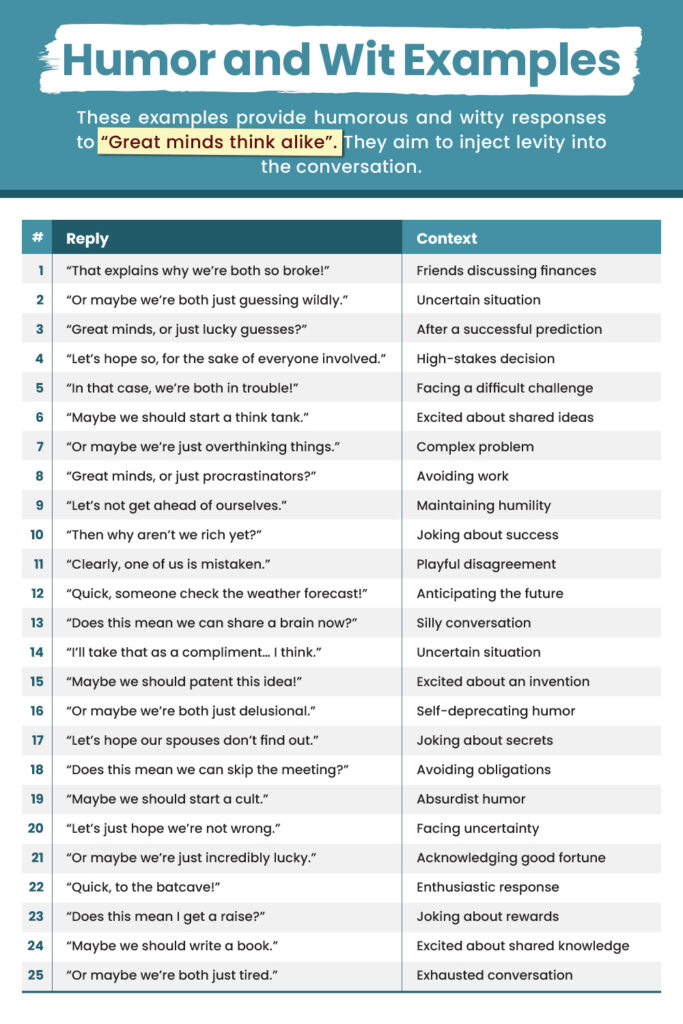
Polite Acknowledgement Examples
These examples illustrate polite acknowledgements of the phrase “Great minds think alike”. They are suitable for formal settings.
| # | Reply | Context |
|---|---|---|
| 1 | “I appreciate that sentiment.” | Formal meeting |
| 2 | “Thank you, I agree with your point.” | Professional discussion |
| 3 | “That’s an interesting perspective, and I concur.” | Academic setting |
| 4 | “I’m glad we share the same viewpoint.” | Business negotiation |
| 5 | “It’s good to know we’re on the same page.” | Team meeting |
| 6 | “I appreciate your agreement.” | Formal presentation |
| 7 | “That’s kind of you to say.” | Networking event |
| 8 | “I’m pleased we have a shared understanding.” | Contract discussion |
| 9 | “Thank you for your agreement on this matter.” | Legal setting |
| 10 | “I value your perspective and agree.” | Board meeting |
| 11 | “It’s reassuring that we have aligned thoughts.” | Strategic planning |
| 12 | “I find that to be a valid point, and I agree.” | Panel discussion |
| 13 | “I appreciate your acknowledgment.” | Client meeting |
| 14 | “It’s beneficial that we share this view.” | Policy discussion |
| 15 | “I am in agreement with your assessment.” | Expert consultation |
| 16 | “That’s a fair point, and I agree.” | Debate or argument |
| 17 | “I acknowledge your agreement with my viewpoint.” | Formal debate |
| 18 | “Thank you for your concurrence.” | Official statement |
| 19 | “I am pleased that we have similar thoughts.” | Business proposal |
| 20 | “It is appreciated that we are in agreement.” | Legal document |
| 21 | “I am grateful for your understanding.” | Negotiation |
| 22 | “It is reassuring that we are aligned on this.” | Project Kickoff |
| 23 | “I find your perspective insightful and agree.” | Academic conference |
| 24 | “Thank you for sharing your thoughts.” | Presentation |
| 25 | “I value knowing we are on the same page.” | Team meeting |
Printable Examples:
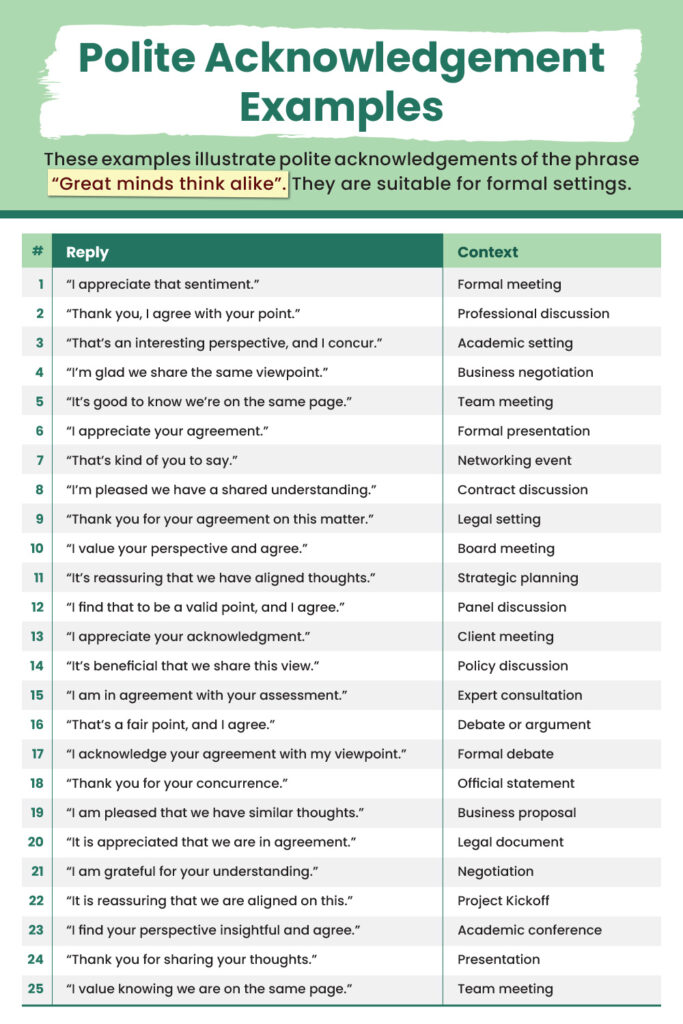
Playful Disagreement Examples
These examples demonstrate ways to playfully express disagreement with the phrase “Great minds think alike”. They maintain a lighthearted tone.
| # | Reply | Context |
|---|---|---|
| 1 | “Well, someone’s gotta be wrong then!” | Friendly banter |
| 2 | “Maybe just similar ones this time.” | Playful disagreement |
| 3 | “Let’s agree to disagree… playfully!” | Engaging debate |
| 4 | “Or maybe one of us needs more coffee.” | Lighthearted setting |
| 5 | “I’m willing to concede… maybe.” | Friendly competition |
| 6 | “Perhaps we’re both slightly off?” | Uncertain situation |
| 7 | “Let’s see who’s right in the end!” | Anticipating results |
| 8 | “Or maybe we’re both just stubborn.” | Joking about character |
| 9 | “Time will tell who’s the great one here.” | Teasing conversation |
| 10 | “I guess we’ll have to arm wrestle to decide.” | Humorous challenge |
| 11 | “Maybe we should consult a higher power.” | Absurdist humor |
| 12 | “Or perhaps we’re both just having a bad day.” | Self-deprecating humor |
| 13 | “I’m still open to convincing you otherwise.” | Friendly persuasion |
| 14 | “Let’s just blame it on the weather.” | Humorous excuse |
| 15 | “I’m sticking to my guns, playfully.” | Friendly disagreement |
| 16 | “Maybe we need a tie-breaker round.” | Competitive banter |
| 17 | “I’ll challenge you to a duel… of wits!” | Humorous challenge |
| 18 | “Or maybe we’re both just pretending to know.” | Self-aware humor |
| 19 | “Let’s just say one of us is more ‘great’.” | Teasing comment |
| 20 | “I’m willing to bet on my version of ‘great’.” | Humorous challenge |
| 21 | “Maybe we should ask for a second opinion.” | Humorous consultation |
| 22 | “Or perhaps we’re both just dreaming.” | Absurdist humor |
| 23 | “I’m not convinced, but I’m willing to listen.” | Friendly discussion |
| 24 | “Let’s just agree that we both have opinions.” | Humorous concession |
| 25 | “I’ll humor you, but I’m not changing my mind.” | Playful stubbornness |
Printable Examples:
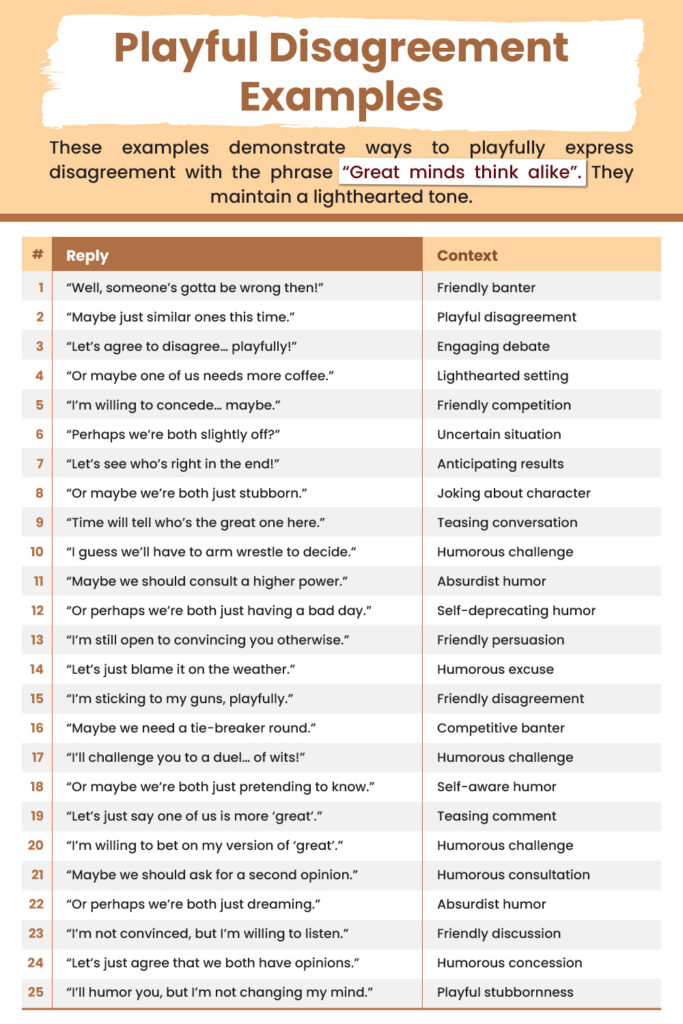
Usage Rules
When responding to “Great minds think alike,” several usage rules should be considered. The most important rule is ensuring your response is contextually appropriate.
Consider your relationship with the speaker and the setting of the conversation. A humorous response might be acceptable among friends but inappropriate in a formal business meeting.
Grammatical accuracy is also crucial. Ensure your response is grammatically correct and clear.
Avoid slang or jargon that might be misunderstood. Maintain a consistent tone throughout the conversation.
If the original statement was lighthearted, your response should reflect that. If the statement was serious, your response should be more formal and respectful.
Finally, be mindful of cultural differences. Some cultures may find the phrase or certain responses to it more acceptable than others.
Common Mistakes
One common mistake is responding inappropriately to the context. For example, using a sarcastic or humorous response in a formal setting can be perceived as disrespectful.
Another mistake is using grammatically incorrect language. Ensure your response is free of errors in grammar and spelling.
Misinterpreting the intent of the original statement is also a frequent error. Make sure you understand whether the speaker is being sincere or sarcastic before responding.
Using overly complex language can also be a mistake. Keep your response clear and concise.
Avoid using jargon or technical terms that the other person may not understand. Finally, failing to acknowledge the other person’s statement can also be seen as rude.
Even a simple acknowledgement is better than no response at all.
| Mistake | Incorrect Example | Correct Example |
|---|---|---|
| Inappropriate Tone | “Yeah, right. As if we’re both geniuses.” (sarcastic in a serious meeting) | “I agree, it’s a good idea.” (formal agreement) |
| Grammatical Error | “Me too think the same.” | “I think so too.” |
| Misinterpretation | (Ignoring the statement completely) | “Yes, I agree with that point.” |
| Overly Complex Language | “My cognitive processes are congruent with your assertion.” | “I agree with your idea.” |
| Failure to Acknowledge | (Silence after the statement) | “That’s an interesting point.” |
| Using Slang | “Word, that’s totally what’s up.” | “I agree with your assessment.” |
| Being Disrespectful | “That’s the dumbest thing I’ve ever heard.” | “I have a different perspective on that.” |
| Using Jargon | “That synergizes perfectly with our KPIs.” | “That aligns well with our goals.” |
Practice Exercises
The following exercises will help you practice crafting appropriate responses to “Great minds think alike” in various scenarios. Consider the context, your relationship with the speaker, and the desired effect before choosing your response.
| # | Scenario | Your Response (Fill in the Blank) |
|---|---|---|
| 1 | A colleague in a formal meeting says, “Great minds think alike” after you suggest a new strategy. | ____________________________________________________ |
| 2 | A friend says, “Great minds think alike” after you both order the same dish at a restaurant. | ____________________________________________________ |
| 3 | Your boss says, “Great minds think alike” after you propose a solution to a problem. | ____________________________________________________ |
| 4 | A stranger says, “Great minds think alike” after you both reach for the same item at a store. | ____________________________________________________ |
| 5 | A family member says, “Great minds think alike” after you make the same joke. | ____________________________________________________ |
| 6 | A teammate says, “Great minds think alike” after you both suggest the same marketing campaign. | ____________________________________________________ |
| 7 | A client says, “Great minds think alike” after you offer the same business solution. | ____________________________________________________ |
| 8 | An acquaintance says, “Great minds think alike” after you both express the same opinion on a movie. | ____________________________________________________ |
| 9 | A professor says, “Great minds think alike” after you answer a question in class the same way as another student. | ____________________________________________________ |
| 10 | A mentor says, “Great minds think alike” after you both identify the same area for improvement in a project. | ____________________________________________________ |
Answer Key:
| # | Scenario | Correct Response |
|---|---|---|
| 1 | A colleague in a formal meeting says, “Great minds think alike” after you suggest a new strategy. | “I appreciate that. I believe this strategy aligns well with our objectives.” |
| 2 | A friend says, “Great minds think alike” after you both order the same dish at a restaurant. | “Clearly! We have excellent taste.” |
| 3 | Your boss says, “Great minds think alike” after you propose a solution to a problem. | “Thank you. I’m glad we’re on the same page.” |
| 4 | A stranger says, “Great minds think alike” after you both reach for the same item at a store. | “Indeed! It must be a popular item.” |
| 5 | A family member says, “Great minds think alike” after you make the same joke. | “It runs in the family!” |
| 6 | A teammate says, “Great minds think alike” after you both suggest the same marketing campaign. | “That’s a great sign! Let’s collaborate on it.” |
| 7 | A client says, “Great minds think alike” after you offer the same business solution. | “Excellent! I’m confident this solution will meet your needs.” |
| 8 | An acquaintance says, “Great minds think alike” after you both express the same opinion on a movie. | “Right? It was fantastic!” |
| 9 | A professor says, “Great minds think alike” after you answer a question in class the same way as another student. | “I appreciate the validation of my thought process.” |
| 10 | A mentor says, “Great minds think alike” after you both identify the same area for improvement in a project. | “Thank you. I value your insight and agree with your assessment.” |
Printable Exercises:
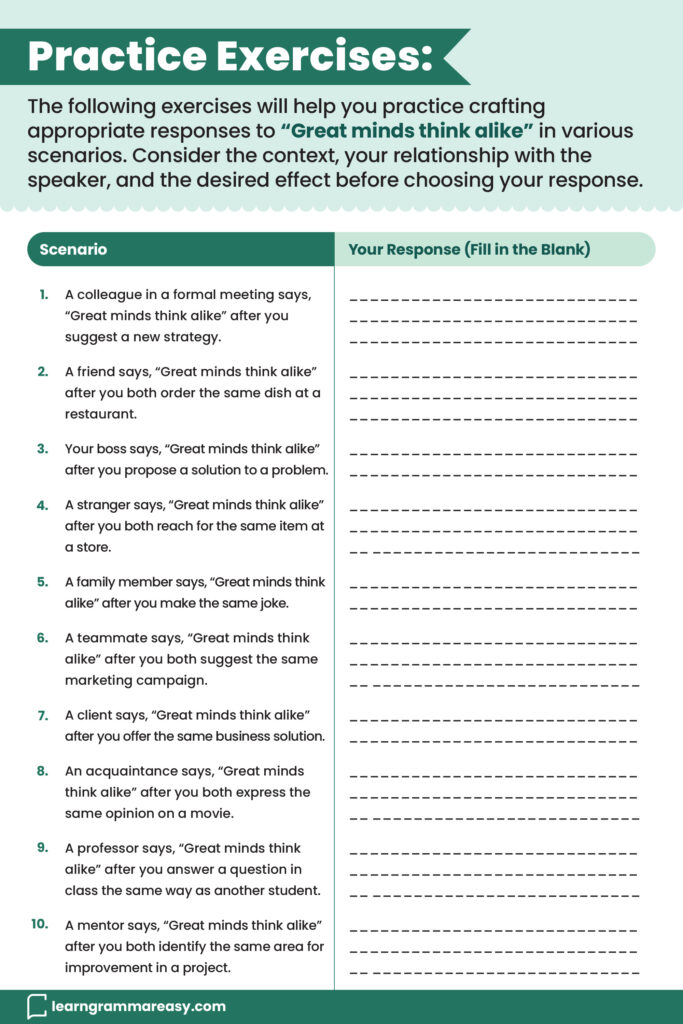
Advanced Topics
For advanced learners, exploring the historical and cultural context of the phrase “Great minds think alike” can provide a deeper understanding. Researching its origins and variations in different languages can offer valuable insights.
Additionally, analyzing the phrase’s use in literature and media can reveal its nuanced meanings and applications.
Another advanced topic is exploring the psychology behind the phrase. Why do people use it?
What are the psychological benefits of expressing agreement? How does it contribute to social bonding?
Finally, consider the philosophical implications of the phrase. Does it imply a universal truth?
Does it suggest a shared consciousness? These advanced topics can lead to a more profound appreciation of the complexities of language and communication.
FAQ
Here are some frequently asked questions about responding to “Great minds think alike”:
- Is it always appropriate to respond to “Great minds think alike?”
Generally, yes. Acknowledging the statement is usually polite. However, consider the context and your relationship with the speaker. In very formal settings, a simple nod or acknowledgement might be sufficient.
- What if I don’t agree with the person who says “Great minds think alike?”
You can politely disagree. Try saying something like, “That’s an interesting perspective, but I see it differently.” Avoid being confrontational or dismissive.
- Can I use sarcasm when responding to “Great minds think alike?”
Sarcasm can be risky. Use it only if you know the person well and are sure they will understand your intent. Otherwise, it’s best to avoid sarcasm in formal or professional settings.
- What’s the best way to respond in a business meeting?
In a business meeting, a polite and professional response is best. Try saying something like, “I agree, that’s a good point” or “I’m glad we’re on the same page.”
- How can I make my response more creative?
Try using humor or wit, but make sure it’s appropriate for the context. You can also expand on the idea or offer a unique perspective.
- Is there a difference between responding to a friend versus a stranger?
Yes. With a friend, you can be more casual and humorous. With a stranger, it’s best to be polite and respectful.
- What if I’m not sure what the person means by “Great minds think alike?”
Ask for clarification. You can say something like, “What do you mean by that?” or “Can you elaborate on that point?”
- Are there any cultural differences in how this phrase is used?
Yes. Some cultures may use the phrase more frequently than others. It’s always a good idea to be aware of cultural norms when communicating.
- How do I avoid sounding arrogant when responding?
Avoid boasting or being overly confident. Focus on the shared idea rather than your own intelligence. Try saying something like, “I’m glad we both see it that way.”
- What if someone says “Great minds think alike” after I make a mistake?
You can use humor to deflect the situation. Try saying something like, “Well, even great minds make mistakes!”
Conclusion
Responding effectively to the phrase “Great minds think alike” involves understanding its nuances, contextual appropriateness, and grammatical accuracy. Mastering the art of crafting clever, respectful, and engaging replies can significantly enhance your communication skills.
Whether you are aiming for agreement, humor, or polite acknowledgement, the key is to be mindful of your audience and the setting.
By understanding the different types of responses and practicing your skills, you can confidently navigate various conversational scenarios. Remember to avoid common mistakes, such as inappropriate tone or grammatical errors.
With practice and attention to detail, you can become a master of responding to this common idiom, fostering stronger relationships and enhancing your overall communication effectiveness. Keep practicing, and soon you’ll be crafting perfect replies with ease.
